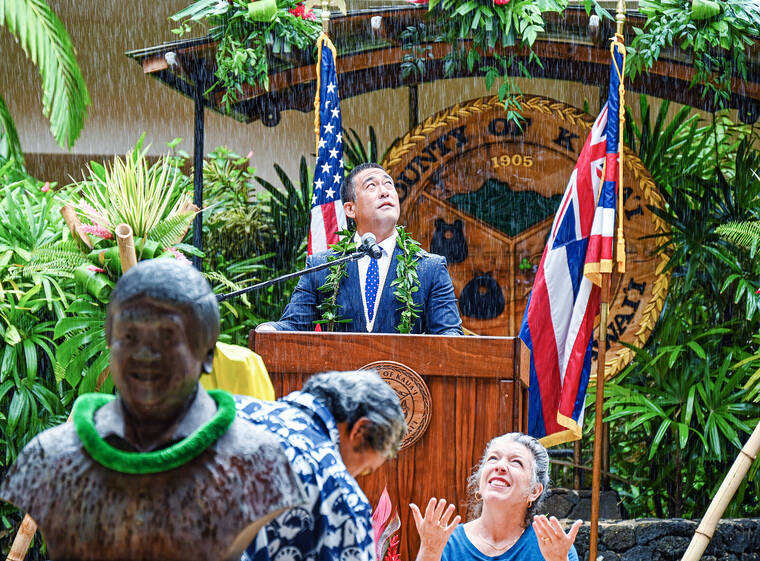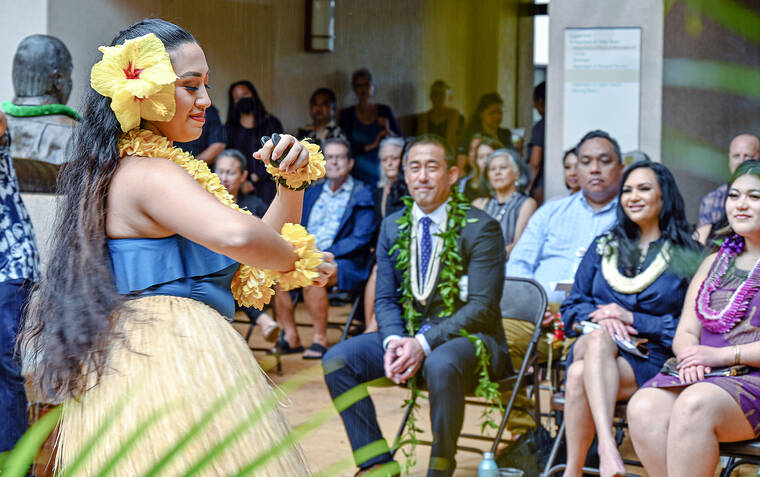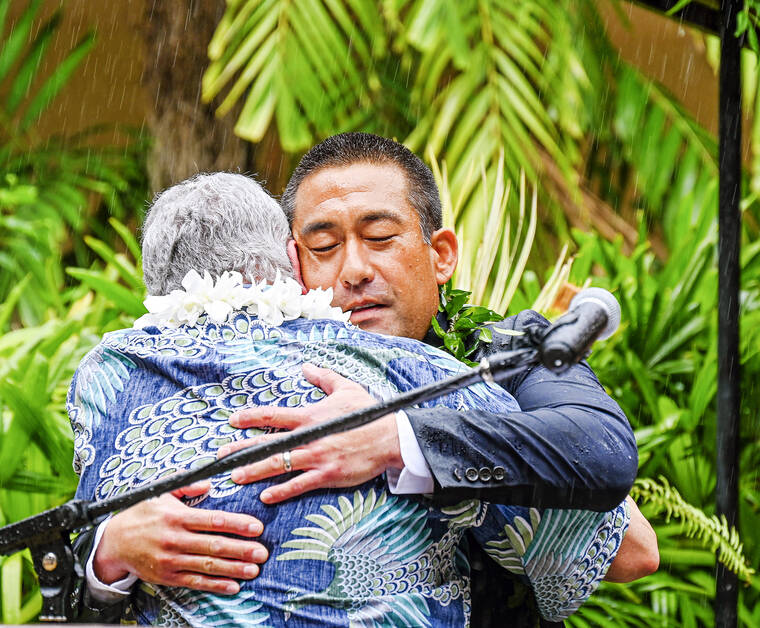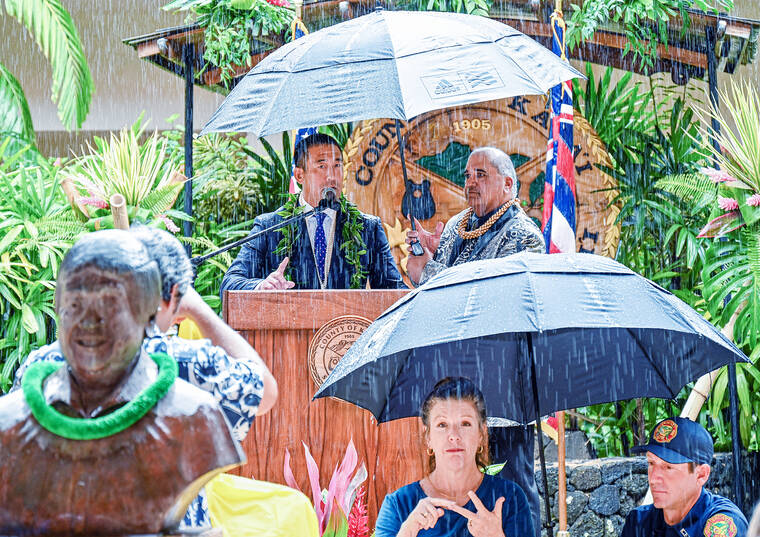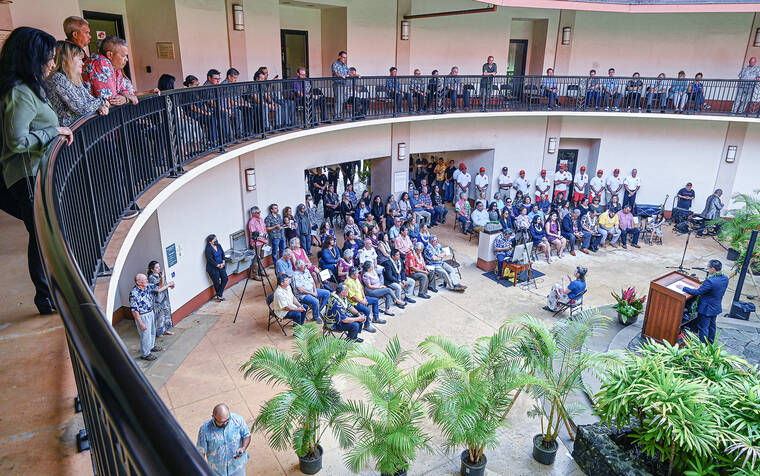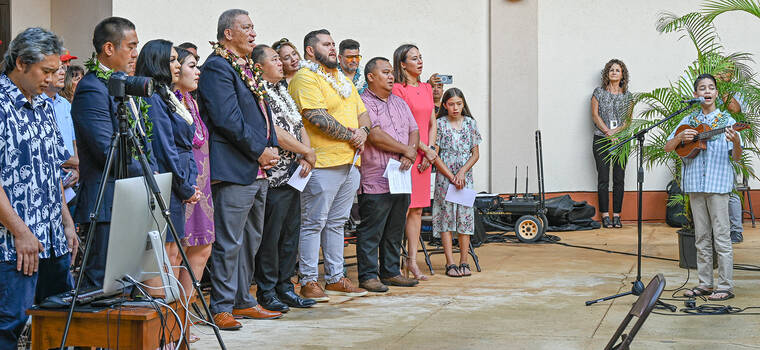LIHU‘E — In a speech peppered with surfing puns and analogies, Mayor Derek S.K. Kawakami announced his plans to boost spending in the 2023-24 fiscal year.
Officials and County of Kaua‘i employees crowded into the Mo‘ikeha Building rotunda at the Lihu‘e Civic Center on Tuesday morning to watch the recently reelected mayor deliver his first in-person State of the County address since 2019.
“If we liken being a mayor to being a surfer, then the county’s budget is our surfboard,” said Kawakami, a frequent surfer in his free time. “It is the vessel by which government is made possible. No one board is fit for every wave. It’s uniquely crafted for specific conditions, but also designed to adapt and be flexible.”
The budget Kawakami outlined is significantly larger than the 2022-23 budget, reflecting an increase in revenues.
While last year Kawakami proposed a $260.2 million operating budget and $48.9 million capital improvement projects budget, the plan he put forward on Tuesday includes an operating budget of $312 million and a capital improvement project (CIP) budget of $90 million — a total increase of about $93 million. The CIP budget funds major infrastructure projects with one-time payments, while the operating budget includes recurring costs like personnel and retirees’ health and pension benefits.
Revenues are projected to increase to $328.2 million in the 2023-24 fiscal year amid rising property values, including $32.4 million in general excise tax (GET) revenue, $23 million in transient accommodations tax (TAT) proceeds, and $219.8 million in real property tax revenue — up from $187.5 million in the previous fiscal year.
The mayor highlighted efforts to ensure the majority of the tax burden falls upon off-island investors, including a proposed 10 percent decrease to the residential and homestead property tax rates. Transient and non-residents currently contribute more than 63 percent of general fund revenues, Kawakami said.
In addition, the mayor emphasized programs to generate funding through a paid parking system for visitors at Po‘ipu, Lydgate and Black Pot beach parks, and to clamp down on illegal vacation rentals — which he reported had reached the lowest rate in decades.
“As our government adapts to our growing population, so must our community and our island. If there’s one thing that frustrates a surfer, it’s a crowded line-up,” Kawakami said.
“And let’s face it, at times Kaua‘i feels crowded. While the county does not control population or visitor arrivals, we can help to manage the way people move, how they build, and where they stay.”
Much of the new budget would fund government personnel, whose salaries and benefits currently make up 77 percent of the $180.4 million in the general fund.
The proposal would add a new deputy county attorney, liquor licensing clerk, and positions in homeless services, parks, real property tax, along with 12 additional Kaua‘i Fire Department Ocean Safety Bureau lifeguards.
Those officers are intended to reduce drownings by expanding hours and coverage in a new “Dawn to Dusk” program.
The capital improvements budget almost doubles in the 2023-24 fiscal year, with the bulk of CIP funding going to deferred maintenance, solid waste and wastewater projects.
Infrastructure investments include more than $30 million for road repaving and improvements, along with $10 million to repair the roof of the Kaua‘i War Memorial Convention Hall and replace the air conditioning system at the Kaua‘i Police Department
headquarters in Lihu‘e.
The mayor hopes to match the $6.5 million invested by the state to upgrade Vidinha Stadium, which will improve lighting, replace the track, and convert the field to artificial turf.
Kawakami named solid waste management as the “most significant issue facing our island right now,” specifically the need to site a new landfill, with the current landfill expected to reach capacity before a new one can be sited and built.
As an olive branch to residents of Kekaha, who house the current landfill and are likely candidates to house the next one, Kawakami announced plans to increase funding to the Kekaha Host Community Benefits Program, which provides millions in funds to Kekaha community programs.
A significant chunk of the budget would go toward paying down debts, Kawakami said, including a $13 million loan used to construct the Lima Ola affordable housing project in Lihu‘e. More affordable housing construction is in the works, with the county planning to break ground on 400 new units of housing in 2023.
He also announced plans for a $1 million grant program to support nonprofit partners in drug treatment and mental health.
“If everything aligns perfectly for a surfer, for a brief moment in time we can ride on water,” said Kawakami to conclude his speech. “It is a feeling that cannot be described in words, one that surfers try to replicate over and over again. It is that same feeling I have now and every day that I have the honor of being your mayor. It is in the work that we do, in the families we raise, in the community we build. It is in the people we serve.”
The speech was interrupted by a light drizzle that turned into a downpour as the morning progressed. County employees rushed to cover the mayor with an umbrella. “God, please make it rain more,” Kawakami joked, looking toward the sky.
Much like a surfer getting out of the water after a set, the mayor was soaking wet when he stepped off the podium.
Former mayor and current County Council Member Bernard Carvalho reflected on the many State of the County speeches he delivered in his 10 years at the helm, and emphasized the county council still has a role to play in shaping the budget. “There were some great things there,” said Carvalho. “All the priorities hit — housing, solid waste, infrastructure. But it’s how we work together that’s important.”
The mayor will submit the budget as a bill to the county council for review and approval.
The process may be more contentious than in recent years, with County Council Chair Mel Rapozo reporting Tuesday that he planned to lead a robust budget review in the months ahead. The fiscal year starts July 1.
•••
Guthrie Scrimgeour, reporter, can be reached at 808-647-0329 or gscrimgeour@thegardenisland.com.
